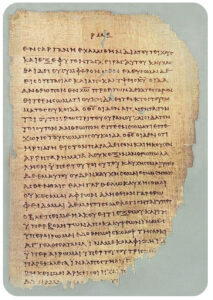 compare translations
compare translations
To demonstrate how different Bible translations of the same original text can differ, Turning to God’s Word has compared nine translations of the same well-known biblical text. Scholars date the original Greek text of the Gospel According to John to around 90 A.D., and so the Greek text of the Gospel According to John 3:7 appears first in our example. Following that are nine translations of the same verse, beginning with the Latin Vulgate Bible, which was used by the Catholic Church for many centuries. The remaining eight examples are English translations and include the Catholic Douay-Rheims and Protestant King James Version, as well as six contemporary translations.
μὴ θαυμάσῃς ὅτι εἶπόν σοι, δεῖ ὑμᾶς γεννηθῆναι ἄνωθεν.—Greek New Testament (90)
“Non mireris quia dixi tibi: oportet vos nasci denuo.”—Latin Vulgate (384)
“Wonder not, that I said to thee, you must be born again.”—Douay-Rheims (1582)
“Marvel not that I said unto thee, Ye must be born again.”—King James Version (1611)
“Do not marvel that I said to you, ‘You must be born anew.'”—Revised Standard Version (1946)
“Do not be surprised when I say: You must be born from above.”—Jerusalem Bible (1955)
“Do not be amazed that I told you, ‘You must be born from above.'”—New American Bible (1970)
“Do not be surprised when I say: You must be born from above.”—New Jerusalem Bible (1985)
“Do not be astonished that I said to you, ‘You must be born from above.'”—New Revised Standard Version (1989)
“Do not be amazed that I told you, ‘You must be born from above.'”—New American Bible Revised Edition (2011)
The above English translations differ in two key areas. First, the translation of the initial verb is rendered as “marvel,” “be amazed,” “be astonished,” etc. Second, the final adverb describing how one must be born is rendered differently as “again,” “anew,” and “from above.” Which of these is the best translation? One of these differences represents an error, while the other is a matter of the translator’s choice. Can you tell which is which?
Notice that the adverb at the end of the verse (“again,” “from above,” “anew”) changed at one point in time from “born again” to “born from above” and then remained “born from above.” For many centuries St. Jerome’s translation of the Latin Vulgate was the official Bible of the Church. When the Bible was translated into English, it was the Latin Vulgate that was translated. This left English speakers reading a translation of a translation, multiplying the possibility of an error being introduced into the biblical text. In John 3:7, St. Jerome rendered the Greek word ἄνωθεν that literally means “from above,” as the Latin denuo, which means “anew” or “again.” Looking at the development of English translations, it’s easy to see that the earlier Bibles used only St. Jerome’s translation and so introduced an error in meaning, while the newer translations that rely on original sources agree as to the meaning of the original Greek word.
The second key area in which the translations of John 3:7 differ is between “wondering,” “marveling,” “being surprised,” “being amazed,” and “being astonished.” This shows a range using slightly different words to say what essentially is the same thing, and all are acceptable translations. Different modern translations will render passages such as these somewhat differently, and in many cases it’s entirely possible that all are correct.
When it comes to choosing your Bible, it’s important to use a modern Bible translation from the original languages in order to sidestep the issues that come into play when reading a translation of a translation. Among present-day translations, one isn’t necessarily better than another. In the end, which translation you choose is of far less significance than that you actually read your Bible.
 learn more about words in the Bible
learn more about words in the Bible
Lost in Translation is a weekly e-column about biblical translation written by  Turning to God’s Word author Matthew Phelps. You can visit our searchable archives on our Lost in Translation page to read Matthew’s past entries about the original meaning of words used in Scripture. New entries are posted every Monday. If you’d like to receive a copy of Matthew’s Lost in Translation by email each week, use this link to let us know.
Turning to God’s Word author Matthew Phelps. You can visit our searchable archives on our Lost in Translation page to read Matthew’s past entries about the original meaning of words used in Scripture. New entries are posted every Monday. If you’d like to receive a copy of Matthew’s Lost in Translation by email each week, use this link to let us know.
